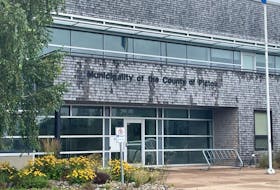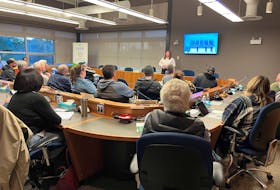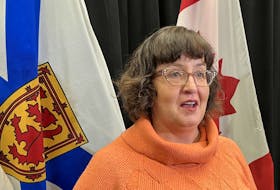In December, Todd Vassallo, a psychotherapist based in Sydney, shared with the Cape Breton Post statistics he’d received from the Nova Scotia Medical Examiner Service. Those figures showed a sizable increase in the number of suicides islandwide — from 15 to 23 — between 2014 and 2015.
And it wasn’t an anomaly — at least in the Cape Breton Regional Municipality. While the overall number in Cape Breton in 2016 fell to 18 suicides, in the CBRM there were 14 suicides in both 2015 and 2016. And the trend seems like it’s continuing in 2017, with seven recorded suicides as of May.
“It looks like that’s our new normal,” said Vassallo, who suspects the true number is even higher because only obvious cases — such as when the person left a note — are officially declared suicides.
“Those numbers only tell part of the story. There are many overdoses that are categorized as accidental overdose, or people that have been struggling with mental illness for a number of years who end up dying unexpectedly at a young age.”
According to Vassallo, the best way to stem the tide of suicides is timely access to mental health services.
Under the current system, a person considering killing themselves is sent to an already-overcrowded emergency room where they are assessed by a nurse, doctor, crisis worker and a psychiatrist. If the person isn’t an imminent threat to kill himself, they are then sent home where they wait for a counselling appointment that is typically months away.
Not only is it costly — the average hospital visit is $1,400 and a one-night stay in a hospital is another $1,350 — it’s ineffective, he said, especially when dealing with a time-sensitive issue like mental health.
“It’s the same as having diabetes. If I’m in critical condition as a diabetic and I need an intervention, someone telling me that someone will see me in nine months, it’s basically inhuman,” he said.
“Suicide is a thing that is time-sensitive, so on the day that I’ve had enough and that I can’t take anymore, and I reach out, that’s the day I need help. If I reach out and someone tells me someone will see me in months, that’s when I say ‘Why bother?’”
While he said the scope of issues impacting mental health is huge, with a wide range of socioeconomic factors such as poverty and families' dynamics changed by out-migration at play, Vassallo said addiction, particularly gambling, is the biggest cause of suicides.
“VLTs are the crack cocaine of addiction,” he said. “If I’m a gambling addict and I go to the store to pay for my gas, somewhere someone runs a ticket through a machine that goes ‘Woo-hoo.’ I’m instantly triggered. Every time I turn around Chase the Ace is on, so I’m not compulsively gambling all my family’s liquid capital away, I’m helping charities. So gambling is so insidious, it pervades every part of a person’s life, and it’s socially acceptable and it’s everywhere.”
According to Vassallo, the solution is a parallel, community-based system for mental health care that involves a wide range of people throughout the community working together with the health authority.
He said there is ample money in the health-care system to make meaningful changes, but it has to be redistributed differently.
He pointed to Ontario, which underwent a multimillion-dollar review of its mental health system. In addition to walk-in clinics where a person in distress can come off the street and speak to a therapist, the review led to the creation of different job designations for people who are provincially certified to deal with mental health — from the mental health workers trained to run anger management programs, direct group therapy sessions and perform interventions, up to registered psychotherapists who deliver that sympathetic ear, as well as the skills and strategies to help people change their current situation.
“The vast majority of people who try to access mental health do not need a medical intervention, they need talk therapy or a program. Our whole system is upside down. You see a nurse, then you see a doctor, then you see a crisis worker, then you see a psychiatrist who tells you that you need counselling,” he said.
“Traditionally in Nova Scotia, family doctors are the gatekeepers of the medical system. If a doctor was able to refer a client to private counsellor, they could be seen in a timely manner, and then that counsellor would be able to bill the province, so therefore you could have a bigger network of counselors in the private sector that can help service the medical community.”
Vassallo said there also has to be more focus on specific groups that are at the highest risk. According to the statistics he obtained, there are two vulnerable demographics when it comes to suicides in Cape Breton — girls 15 years old and younger, and men in their late 40s and early 50s. He said this data should be used to target specific resources at those groups.
“Every organism on this planet is struggling for the next second of life. For someone to take their life with their own hand, you have to turn the universal design backwards. To do that somebody has to be suffering so greatly that they’re able to do it. That’s really where we have to get to: how do we put the resources into that demographic to give them what they need in that very terrible moment of time, which again comes back to access.”









